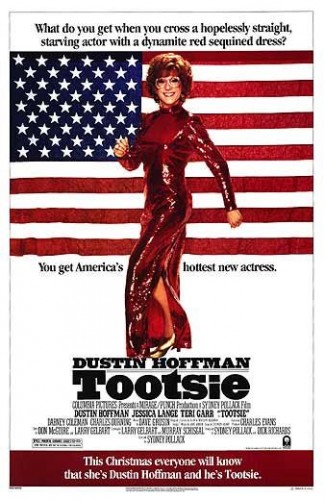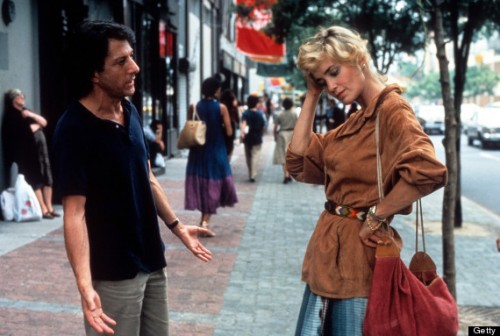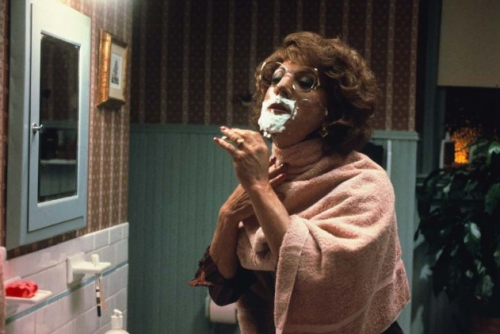
This guest post by Rebecca Cohen appears as part of our theme week on Male Feminists and Allies.
Have you seen the 2012 AFI interview with Dustin Hoffman, where he gets emotional about his role in the cross-dressing 1982 comedy Tootsie? In the video clip, Hoffman relates his disappointment in discovering that, although makeup artists could help him pass as a credible woman, he would never be a beautiful woman. Hoffman says he cried, realizing that if he were at a party he would never approach a woman who looked like him. He concludes tearfully, “There’s too many interesting women I have … not had the experience to know in this life because I have been brainwashed.”
The video of those remarks went viral recently, and most reactions were enthusiastically positive. Hooray for Dustin Hoffman, breaking through his social conditioning to see the world from a woman’s perspective. Thank you to Dustin Hoffman, for expressing the harshness of beauty standards in such a concise and heartfelt way. Making Tootsie made Dustin Hoffman a feminist ally.
Right?
Well… yes and no. Hoffman’s statements, like the movie Tootsie itself, are a good start. They’re a sincere attempt by a well-intentioned man to address feminist issues. Still, both his words and the movie fall short in many ways.
The Good
In Tootsie, Hoffman plays unemployed actor Michael Dorsey, who disguises himself as a woman to land a job on a daytime soap opera. After winning the role, Michael must continue to pretend to the world that he’s actress Dorothy Michaels. Hilarity, as you might expect, ensues.
So what’s feminist about it? Although the word “feminist” is never uttered, Michael plays Dorothy as a bold, liberated woman. At the audition, slimy director Ron Carlisle (Dabney Coleman) tells Dorothy she’s too “soft and genteel” and “not threatening enough” for the part. Dorothy replies: “Yes, I think I know what y’all really want. You want some gross caricature of a woman. To prove some idiotic point, like, like power makes women masculine, or masculine women are ugly… Well shame on the woman who lets you do that.” Right out of the gate, Dorothy not only speaks her mind, but also openly protests sexism.

Although the role she’s auditioning for, Emily Kimberly, is written as a ball-busting harridan, Dorothy plays her with both fire and vulnerability. Director Ron remains unimpressed, but producer Rita Marshall (Doris Bellack) is obviously moved by the portrayal, and Michael/Dorothy gets the job.
This in itself is pretty layered and rather feminist, if you think about it. The role of Emily Kimberly is written as a sexist stereotype, a cardboard cutout of an unfeminine woman – basically, a man in a dress. But when presented with an actual, literal man in a dress, Ron declares him too feminine. The film thus (probably unintentionally) unpacks some complex ideas about gender and performativity. In order to pass as a woman Michael must play Dorothy as delicate and refined; in a way, he has to present as more feminine than a “real” woman. And this, ironically, almost costs him the role.
From there, the movie continues to develop an overtly feminist narrative. In order to avoid kissing a male co-star, Michael refuses to perform a scene as written. Instead of swooning, the character asserts herself. Producer Rita loves it. Michael/Dorothy continues to depart from the scripts, insisting on making Emily Kimberly feisty and self-assured, and Rita continues to allow it. The character’s popularity grows, Dorothy’s fame grows, and soon Dorothy becomes an outright feminist role model, even appearing on the cover of Ms. Magazine (and Cosmopolitan too, perhaps so we can be assured she’s not that militant). At one point, Rita marvels at what Dorothy has accomplished: “You are the first woman character who is her own person, who can assert her own personality without robbing someone of theirs. You’re a breakthrough lady for us.”
Dorothy also becomes a personal role model for co-star Julie (Jessica Lange). Through her friendship with Dorothy, Julie gains the strength and self-confidence to break up with Ron. She tells Dorothy, “You wouldn’t compromise your feelings like I have. You wouldn’t live this kind of lie, would you?… I deserve something better, you know? I don’t have to settle for this.” Through the movie, Julie repeatedly expresses how Dorothy has taught her to stand up for herself.
At the same time, Michael learns his own lessons about feminism, drawn from his experiences living as a woman. He’s taken aback by the effort and expense required of women to keep themselves attractive. He attempts to voice concerns on set, but gets frustrated when Ron dismissively talks over him. Experiencing the world as Dorothy, Michael comes to believe he really has a new understanding of what women endure. He tells his agent, George (Sydney Pollack): “I feel like I have something to say to women, something meaningful,” explaining how he knows what it is to feel helpless and not in control.
In one of the most memorable moments of the film, Michael/Dorothy, fed up with Ron’s patronizing treatment on set, stands up to him:
Michael/Dorothy: Ron, my name is Dorothy. It’s not Tootsie or Toots or Sweetie or Honey or Doll.
Ron: Oh Christ.
Michael/Dorothy: No, just Dorothy. Now Alan’s always Alan, Tom is always Tom, and John’s always John. I have a name too; it’s Dorothy. Capital D, O, R, O, T, H, Y. Dorothy.
Titling the film Tootsie emphasizes that Michael’s experience of being marginalized, of struggling to demand respect, is meant to be understood as a focal point of the film.
So, clearly it’s a feminist movie. In some ways.

The Bad
So why does Rita Marshall, a seasoned and capable TV producer, never include independent, assertive women on her show until Dorothy Michaels comes along and steamrolls her into it? Did it never occur to her that such a thing was possible, or that her mostly female audience might enjoy it? Similarly, why is Dorothy the only woman who stands up to Ron’s harassment, even though it’s evident he’s been behaving this way with impunity for years?
The film seems to imply that Michael, coming from a position of male privilege, is uniquely positioned to call out sexism. He isn’t accustomed to enduring second-class status. Women deal with it grudgingly, because, you know – that’s how the world works. But Michael hasn’t been conditioned to accept it. So he doesn’t.
Here’s the thing. This situates Michael as the White Knight, the male savior of women’s rights. Spending only a few months experiencing how the world treats a woman, he’s better able to challenge the status quo than the women who’ve spent their entire lives experiencing it. Like many cross-dress comedies, Tootsie falls into the trap of implying that a man is better at being a woman than any woman knows how to be.
Also, what does Michael do with his newfound understanding of the struggles women face? He sees how Ron mistreats Julie, lying to her yet claiming it’s to spare her feelings. But Michael does essentially the same thing to his longtime friend Sandy (Terri Garr). He sleeps with Sandy to cover up his secret, then lies to her and strings her along even as he’s steadily falling in love with Julie. It’s women, specifically Sandy and Julie, who bear the brunt of the harm caused by Michael’s deceit. Recognizing how men use lies to abuse women doesn’t stop Michael from doing it himself.

Even after the truth is revealed, Michael never apologizes to Julie for deceiving her. (Interestingly, he does apologize to her father in suitably man-to-man fashion.) He tells Julie, “I just did it for the work. I didn’t mean to hurt anybody.” In other words, instead of acknowledging her hurt and owning the harm he caused, he tries to explain and justify. He tells her, “I was a better man with you as a woman then I ever was with a woman as a man.” This is the lesson Michael draws from his experience as Dorothy: it has made him a better man… somehow.
Thus the film undercuts its early feminist promise. Michael never has to answer to the women who admired him as a feminist icon, only to find out he was a man all along. He never apologizes to the women he deceived on a very intimate level. He doesn’t, when all is said and done, make anything better for women. But that’s not important. What matters is that he has become a better man. “I just gotta learn to do it without the dress,” he explains.
Terri Garr, speaking to the Onion AV Club in 2008, shared her thoughts about Dustin Hoffman’s Tootsie-inspired insights about gender: “They put a man in a dress, and he’s supposed to know what it feels like to be a woman. But of course he doesn’t. I think what Dustin [Hoffman] says is, ‘I realize now how important it is for a woman to be pretty. And I wasn’t pretty.’ God! That’s all you realized? Jesus Christ. Oh well. Don’t quote me. Actually, quote me.”
Dustin Hoffman’s epiphany about women being judged based on their looks is most certainly A Good Thing. So is his acknowledgment of his own role in marginalizing women who don’t meet a certain beauty standard. But even as he laments all the interesting women he never took the time to know, Hoffman’s comments still center on himself. It’s about his loss in not getting to know these hypothetical women. It’s about his regret. And fundamentally, as Terri Garr points out, something is still missing.
[youtube_sc url=”http://youtu.be/Ch57pIuYhbM”]
I’m genuinely pleased to know that making Tootsie taught Dustin Hoffman to be a better man, just as his character Michael Dorsey learned to be a better man. But being a male feminist or feminist ally isn’t primarily about men’s personal character growth. It’s supposed to be about liberating and empowering women. And it’s frustrating to see people respond as though Hoffman has discovered some earth-shattering truth, when women have already spoken and written about these issues at length. Why does it carry more weight when a straight, white, cis, wealthy, famous man expresses it?
Of course, like it or not, people listen when straight, white, cis, wealthy, famous men speak. So I can’t criticize Dustin Hoffman for using the platform he has to amplify a feminist message, even if what he says should be obvious to everyone by now. Terri Garr is absolutely right: Dressing as a woman for a day does not convey the entirety of what it means to be a woman in a patriarchal society. But I wouldn’t object if more men wanted to give it a try.
Rebecca Cohen is the creator of the webcomic “The Adventures of Gyno-Star,” the world’s first (and possibly only) explicitly feminist superhero comic.